
Publications
Some enduring themes in my research:
1. Prediction and Accommodation
Like Lakatos, I see the justification for theory-change in the surplus predictive success of the superseding theory. But what counts as a predictive success needs careful clarification. Contrary to Lakatos’s initial view, whether or not the evidence involved was unknown at the time the new theory was first articulated is – in itself – of no significance on my account. What’s the difference between prediction and accommodation? And why does the difference matter? I developed and defended my answers in a number of papers through my career – both directly and via criticism of rival views.
[1989]:
‘Fresnel, Poisson and the White Spot: The Role of Successful Predictions in the Acceptance of Scientific Theories‘ in D. Gooding, T. Pinch & S. Schaffer (eds.) The Uses of Experiment – Studies of Experimentation in Natural Science. C.U.P., pp. 135-57. ISBN: 9780521337687.
[2001b]:
‘Prediction and the Periodic Table’ Studies in the History and Philosophy of Science, 32, pp. 407-452 (with Eric Scerri).
[2002c]:
‘New evidence for old’ in Gärdenfors, Peter, Jan Wolenski, and Katarzyna Kijania-Placek, (eds) In the scope of logic, methodology and philosophy of science: volume two of the 11th international congress of logic, methodology and philosophy of science, Vol. 316. Springer Science & Business Media, pp. 191-212. ISBN: 9781402009303.
[2006a]:
‘Theory-confirmation and history’. in Colin Cheyne, John Worrall (eds) In Rationality and Reality: Conversations with Alan Musgrave. Dordrecht: Springer Netherlands. pp. 31-61. ISBN: 9781402042065.
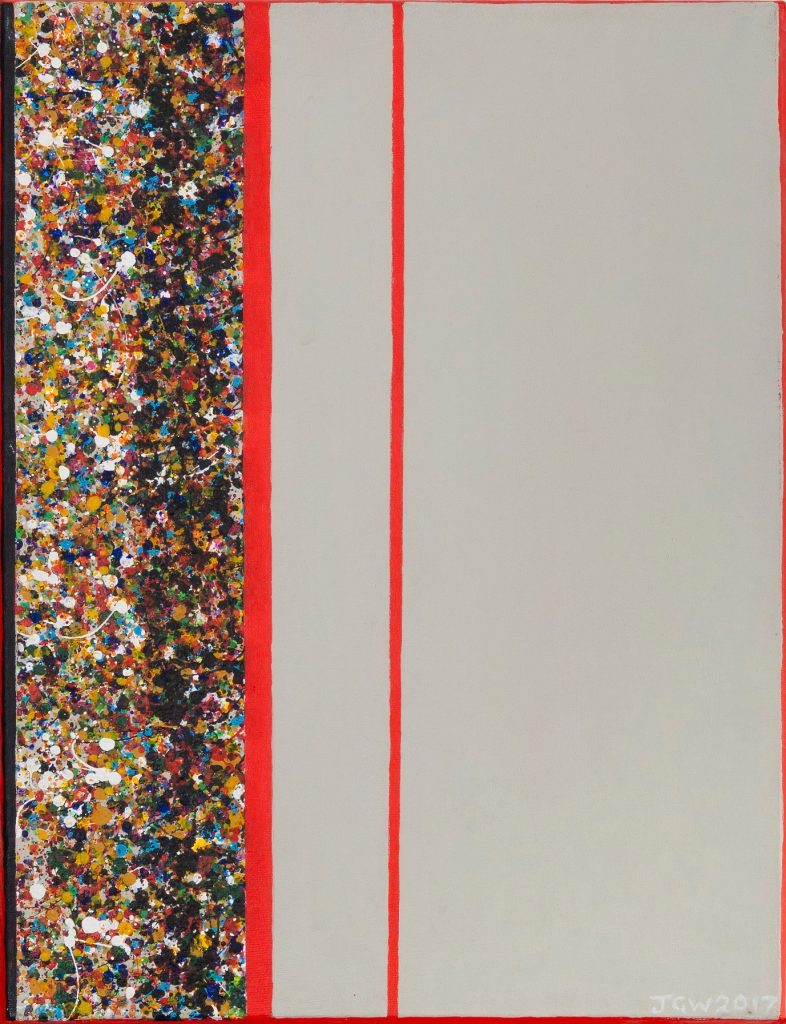
In 2015, the UK GDP was £1,800bn (represented by the width of the canvas). UK exports to other EU countries were worth £230bn (47% of total exports and 13% of GDP (darker multi-coloured band). UK exports to non-EU countries were worth £260bn (lighter multi-coloured band). The balance of trade (exports minus imports) with the EU was minus £60bn (thicker red band) and with non-EU countries was plus £30bn (black band). The overall trade deficit was £30bn (thinner red band in the middle of the canvas, showing the overall deficit as a proportion of GDP.)

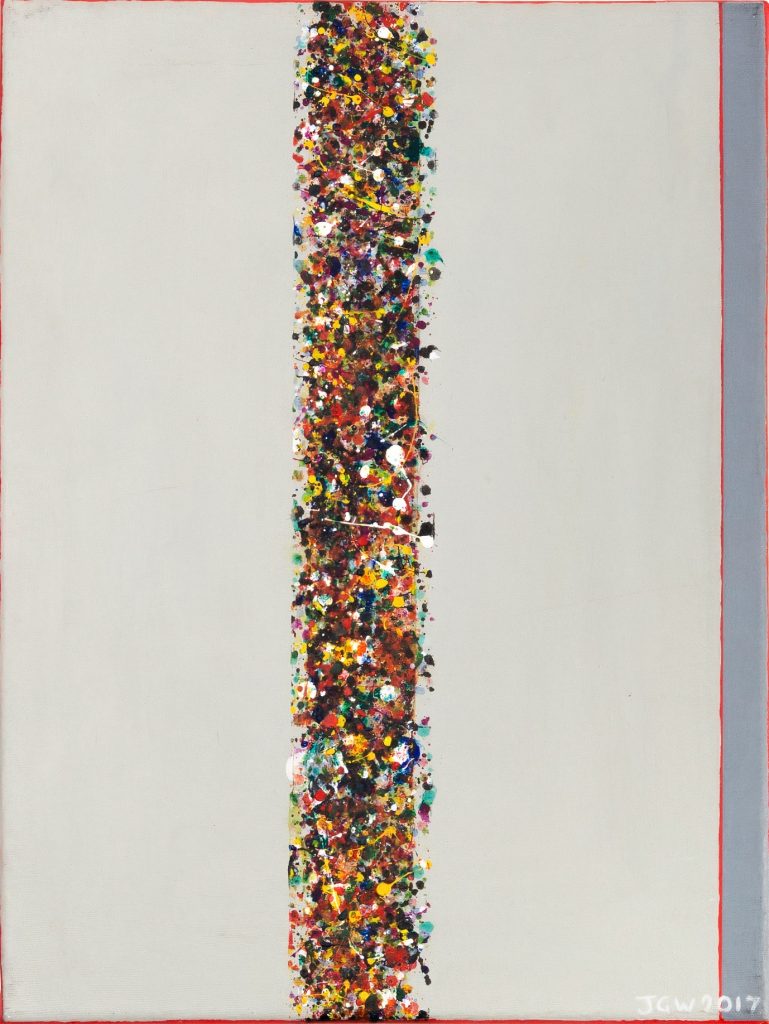
IN 2015, the UK population was 64m (represented by the width of the canvas excluding the dark grey band). UK residents born outside the UK were 8.46m (13% of the population) (multi-coloured band). UK-born citizens resident abroad were 5.5m (dark grey band). Net immigration (people arriving minus people leaving) was 273,000 (thin red band), comprising 165,000 net EU immigrants, 164,00 net non-EU immigrants and 56,000 net UK emigrants.
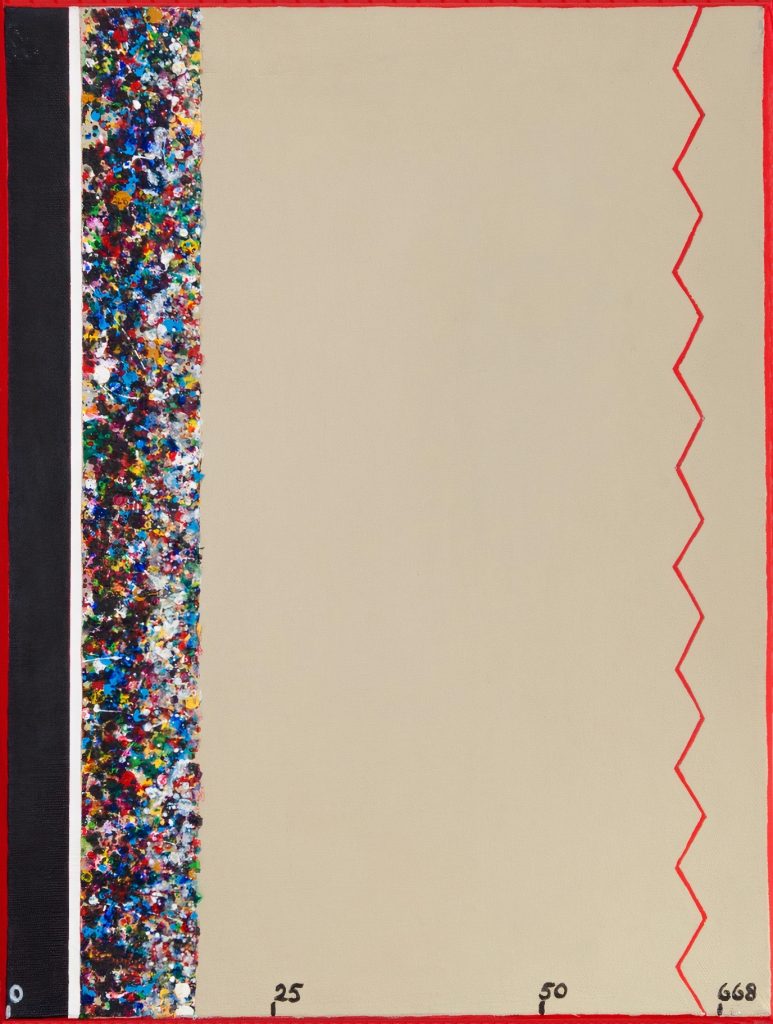
In 2016, total UK public income was £668bn. In 2015, the UK’s full EU membership fee was !17.8bn. After the rebate (originally negotiated by the Thatcher government), it was £12.9bn (the rebate is represented by the right-hand, lighter multi-coloured band). £5.8bn (left-hand, darker multi-coloured band) was returned to the UK in subsidies. SO the net contribution was £7.1bn (black band plus white band), of which £1bn (white band) was for international aid, which the UK would pay anyway.
(Of the net contributors to the EU, the UK was the second largest (after Germany). But the UK was only the 8th largest contributor on a per capita basis; the largest is The Netherlands, which pays per capita 4x what the UK paid.)
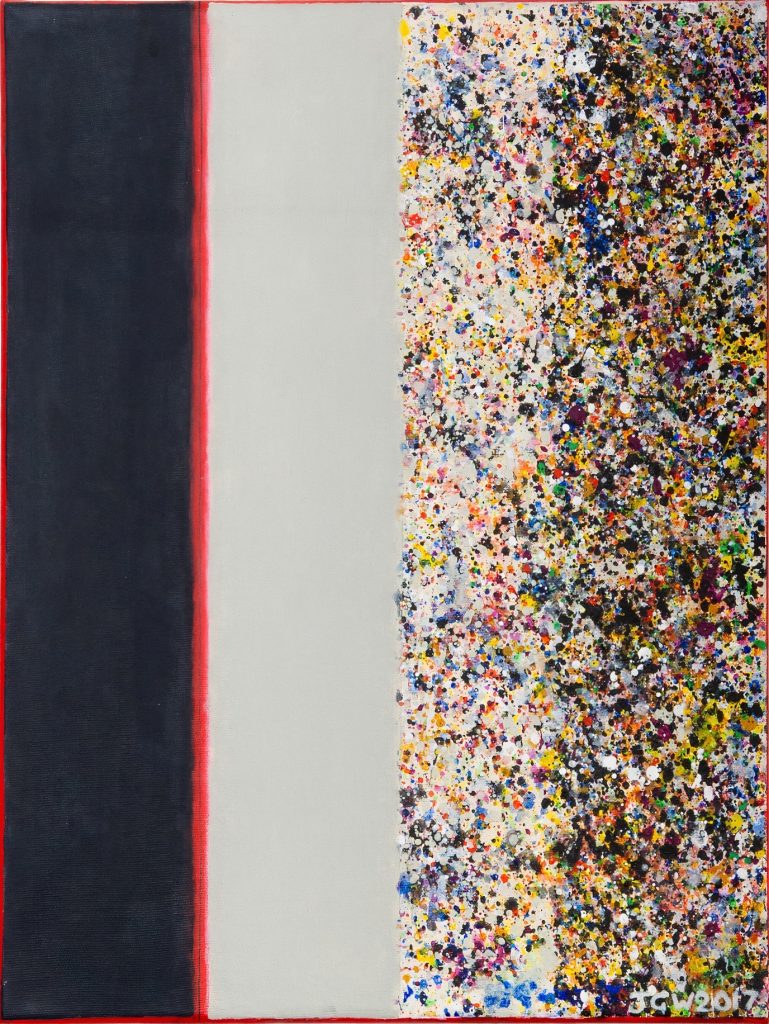
In 2016, the UK population was £64m (represented by the width of the canvas). The electorate was 46.5m. Turnout in the EU referendum was 33.57m. Leave votes was 17.39m (dark grey) and remain votes were 16.18m (beige).
During the 12 months following the referendum, several polls asked voters if they regretted their decision. On average, 6% of leavers wished they had voted remain and 1% of remainers wished they had voted leave (and 26% of non-voters wished they had voted). Adjusting the referendum result in the light of this information gives leavers 16.5m and remainers 17.05m. The fuzzy red band straddling the 50% thin black line illustrates this situation.
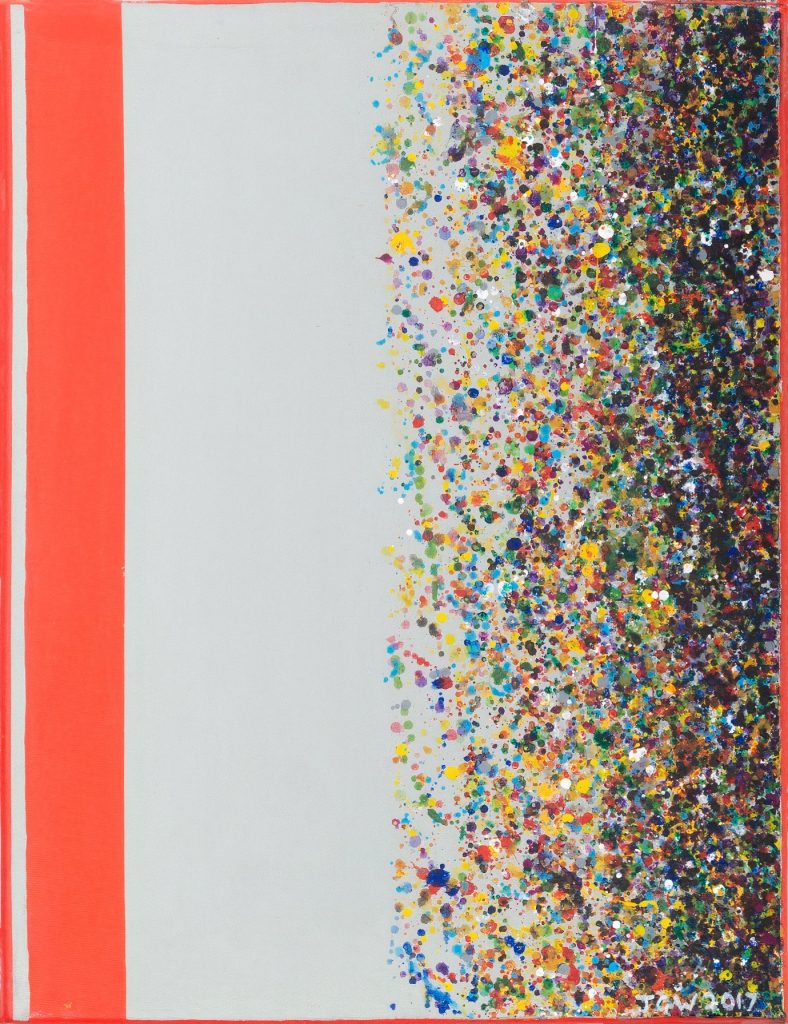
During 1993-2014:
Of 945 Acts of Parliament (primary legislation) (thinner red band plus thinner grey band), 231 (24%) (thinner red band) implemented EU obligations.
OF 33,160 Statutory Instruments (secondary legislation), 4283 (13%) (thicker red band) implemented EU obligations.
The width of the canvas represents total legislation (34,105 items) over this time.
“Regulations” (administrative, quasi-legislative directives) are very difficult to classify, and depend on definitions and where boundaries are set. Accordingly, estimates of the proportion of regulations relating to the EU vary between 15 and 50%. The width of the canvas presents 100% and the graded multi-coloured area represents 15-50% (from the right-hand side).
[2011]:
‘Theory confirmation and novel evidence’ in Mayo, D.G. and Spanos, A. (eds), Error and inference: Recent exchanges on experimental reasoning, reliability, and the objectivity and rationality of science. Cambridge University Press, pp. 125-154. ISBN: 9780521880084..
[2011b]:
‘Underdetermination, realism and empirical equivalence’. Synthese, 180, pp. 157- 172.
[2014]:
‘Prediction and accommodation revisited’. Studies in History and Philosophy of Science Part A, 45, pp. 54-61.
2. Structural Realism
Following Poincaré, I defend a structural version of scientific realism as both incorporating the “no miracles intuition” and being consistent with the facts about fundamental theory-change in science. A very recent paper defends the prima facie surprising view that there is no defensible version of realism stronger than structural realism.
[1989b]:
‘Structural Realism: the Best of Both Worlds?‘, Dialectica, 43./1-2, pp. 99-124.
[1994]:
‘How to Remain (Reasonably) Optimistic: Scientific Realism and the “Luminiferous Ether”‘ in M. Forbes and D. Hull (eds): PSA 1994, Volume 1. Philosophy of Science Association, pp. 334-342. ISBN: 9175863520917586379.
[2007a]:
‘Miracles and models: Why reports of the death of structural realism may be exaggerated’. Royal Institute of Philosophy Supplements, 61, pp. 125-154.
[2011a]:
‘The no miracles intuition and the no miracles argument’ in Dieks, D., Gonzalez, W.J., Hartmann, S., Uebel, T. and Weber, M. (eds) Explanation, prediction, and confirmation. Dordrecht: Springer Netherlands, pp. 11-21. ISBN: 978661311781.
[2011d]:
‘Miracles and structural realism’. In Landry, E. and Rickles, D. (eds), Structural realism: Structure, object, and causality (Vol. 77). Springer Science & Business Media. pp. 77-95. ISBN: 9789400725782.
[2020]:
‘Structural Realism: The Only Defensible Realist Game in Town?’. in W.J. Gonzalez (ed), New approaches to scientific realism, De Gruyter, pp. 169-205.
3. Evidence in Medicine and Evidence-Based Medicine
It should, of course, go without saying that medicine – in particular theories about which treatments are (or are not) effective for a given condition – should be based on evidence. The interest is all in the details. I examine the detailed views of those in the Evidence-Based Medicine movement and argue that they overstate the importance of Randomised Controlled Trials and underplay the significance of ‘pathophysiologic rationale’ (i.e. knowledge of the underlying biochemistry).
[2002b]:
‘What evidence in evidence-based medicine?’ Philosophy of Science 69, no. S3 (20: pp. 316-330.
[2006]:
‘Why randomize? Evidence and ethics in clinical trials’. Contemporary perspectives in philosophy and methodology of science, pp. 65-82.
[2007]:
‘Why there’s no cause to randomize’. The British Journal for the Philosophy of Science, pp. 451-488.
[2007b]:
‘Evidence in medicine and evidence‐based medicine’. Philosophy Compass, 2(6), pp. 981-1022.
[2010]:
‘Do we need some large, simple randomized trials in medicine?’. Epsa Philosophical Issues in the Sciences: Launch of the European Philosophy of Science Association, pp. 289-301.
[2010a]:
‘Evidence: philosophy of science meets medicine’. Journal of evaluation in clinical practice, 16(2), pp. 356-362.
[2011c]:
‘Causality in medicine: Getting back to the Hill top’. Preventive Medicine, 53(4-5), pp. 235-238.
[2022]:
‘Philosophy of Science meets Medicine (Again): a Clearer-Sighted View of the Virtues of Blinding and of Tests for Blinding in Clinical Trials’ in W,J, Gonzalez (ed) Current Trends in Philosophy of Science: a Prospective for the Near Future. Synthese Library, pp. 15-43. ISBN: 9783031013140.
A complete list of my publications
ORIGINAL ARTICLES
[1976]:
‘Thomas Young and the “Refutation” of Newtonian Optics: A Case Study in the Interaction of Philosophy of Science and History of Science‘ in C. Howson (ed): Method and Appraisal in the Physical Sciences, Cambridge University Press, pp. 107-179. ISBN: 9780521113083.
[1976a]:
‘Imre Lakatos (1922-1974): Philosopher of Mathematics and Philosopher of Science’ in R. Cohen, P. Feyerabend and M. Wartofsky (eds): Essays in Memory of Imre Lakatos, Reidel, pp. 1-10. ISBN: 9789401014526.
[1978]:
‘The ways in which the Methodology of Scientific Research Programmes improves on Popper’s Methodology‘ in G. Radnitzky and G. Andersson (eds): Progress and Rationality in Science. Reidel, pp. 45-70. ISBN: 9027709211
[1978a]:
‘Research Programmes, Empirical Support and the Duhem Problem: Replies to Criticism‘ in G. Radnitzky and G. Andersson (eds): Progress and Rationality in Science. Reidel, pp. 321-338. ISBN: 9027709211
[1978b]:
‘Against too much method‘, Erkenntnis, 13, pp. 279-95.
[1978c]:
‘Is the Empirical Content of a Theory Dependent on its Rivals?’, in I. Niiniluoto and R. Tuomela (eds): The Logic and Epistemology of Scientific Change, Acta Philosophica Fennica, XXX, pp. 175-200. ISBN: 9519505415
[1979]:
‘A Reply to David Bloor‘, The British Journal for the History of Science, 12, 1979, pp. 71-81.
[1980]:
‘Facts and Feyerabend’ in H.P. Duerr (ed): Versuchungen: Aufsätze zur Philosphie Paul Feyerabend, Suhrkamp, pp. 298-320. ISBN: 978-3518110447.
[1982]:
‘The Pressure of Light: The Strange Case of the Vacillating ‘Crucial Experiment’‘, Studies in the History and Philosophy of Science, 13, pp. 133-71.
[1982a]:
‘Scientific Realism and Scientific Change‘, The Philosophical Quarterly, 32, pp. 201-231.
[1982b]:
‘Broken Bootstraps‘, Erkenntnis, 18, pp. 105-130.
[1984]:
‘An Unreal Image‘, The British Journal for the Philosophy of Science, 35, pp. 65-80.
[1985]:
‘Scientific Discovery and Theory-Confirmation‘, in J.Pitt (ed): Change and Progress in Modern Science, Reidel, pp. 301-331. ISBN: 9789400965270.
[1985a]:
‘The Background to the Forefront‘, in P. Asquith and P. Kitcher (eds) PSA 1984, Volume 2. Philosophy of Science Association, pp. 145-157. ISBN: 9175862120917586247
[1985b]:
‘Models versus Mathematics?’ Rendiconti della Accademia Nazionale delle Scienze detta dei XL, Serie V, Vol IX, II, pp. 121-137.
[1986]:
‘The problem of Controlling the Process of Cognition’, in O. Molden (ed.) Autonomie und Kontrolle: Steurungskrisen der Modernen Welt, pp. 315-342. OCLC: 311340383
[1988]:
‘The Value of a Fixed Methodology‘, British Journal for the Philosophy of Science, 39, pp. 263-75.
[1989]:
‘Fresnel, Poisson and the White Spot: The Role of Successful Predictions in the Acceptance of Scientific Theories‘ in D. Gooding, T. Pinch & S. Schaffer (eds.) The Uses of Experiment – Studies of Experimentation in Natural Science. C.U.P., pp. 135-57. ISBN: 9780521337687.
[1989a]:
‘Why both Popper and Watkins fail to solve the Problem of Induction‘ in F.D’Agostino and I.C. Jarvie (eds.): Freedom and Rationality: Essays in Honor of John Watkins. Reidel, pp.257-96. ISBN: 9780792302643.
[1989b]:
‘Structural Realism: the Best of Both Worlds?‘, Dialectica, 43./1-2, pp. 99-124.
[1990]:
‘Scientific Revolutions and Scientific Rationality: The Case of the “Elderly Hold-Out”‘ in C. Wade Savage (ed.) Scientific Theories. University of Minnesota Press, pp. 319-354. ISBN: 9780816618019.
[1990a]:
‘Rationality, Sociology and the Symmetry Thesis‘, International Studies in the Philosophy of Science, 4, pp. 305-19.
[1991]:
‘Feyerabend and the Facts‘ in Gonzalo Munevar (ed): Beyond Reason. Dordrecht: Kluwer, pp. 329-353. ISBN: 9789401054065.
[1993]:
‘Falsification, Rationality and the Duhem Problem: Grünbaum vs Bayes’ in J. Earman, A.I. Janis, G.J. Massey and N. Rescher (eds): Philosophical Problems of the Internal and External Worlds. Pittsburgh and Konstanz: University of Pittsburgh Press, pp. 329-72. ISBN: 9783879404018.
[1994]:
‘How to Remain (Reasonably) Optimistic: Scientific Realism and the “Luminiferous Ether”‘ in M. Forbes and D. Hull (eds): PSA 1994, Volume 1. Philosophy of Science Association, pp. 334-342. ISBN: 9175863520917586379.
[1995]:
‘Il realismo scientifico e l’etere luminifero: contro la “meta-induzione” pessimistica’ in A. Pagnini (ed.) Realismo/Antirealismo. Aspetti del Dibattito Epistemologico Contemporaneo. La Nuova Italia Editrice. Florence. pp. 167-204. ISBN: 9788822116420.
[1996]:
‘“Revolution in Permanence”: Popper on Theory-Change in Science‘ in Anthony O’Hear (ed): Karl Popper: Philosophy and Problems. Cambridge University Press. pp. 75-102. ISBN: 9780521558150.
[1996b]:
‘Popper’s Legacy’ in H. Sasson and D.Diamond (eds): LSE on Social Science. Routledge. pp. 159-167. ISBN: 9780753007631.
[1998]:
‘Philosophy of Science’ (Signpost entry), Routledge Encyclopaedia of Philosophy.
[1998a]:
‘Imre Lakatos‘, Routledge Encyclopaedia of Philosophy.
[1998b]:
‘Philosophy and Natural Science’ in A.C. Grayling (ed); Philosophy 2: Further Through the Subject. Oxford University Press. ISBN: 9780198751793.
[1998c]:
“Realismo, racionalidad y revoluciones“, Agora, v. 17, n. 2.
[1999]:
‘Why ask “What is Disease”?’ Metascience.
[1999a]:
‘Two cheers for Naturalised Philosophy of Science’, Science and Education, 8(4), pp. 339-361.
[2000a]:
‘Kuhn, Bayes and “Theory-Choice”: How Revolutionary is Kuhn’s Account of Theoretical Change?’ in Robert Nola and Howard Sankey (eds): After Popper, Kuhn and Feyerabend. Kluwer. pp. 125-151. ISBN: 9780792360322.
[2000b]:
‘The Scope, Limits and Distinctiveness of the Method of “Deduction from the Phenomena”: Some Lessons from Newton’s “Demonstrations” in Optics’, British Journal for the Philosophy of Science, 51, pp. 45-80.
[2000c]:
‘Pragmatic Factors in Theory-Acceptance’ in W. H. Newton-Smith (ed): A Companion to the Philosophy of Science. Blackwell. pp. 349-357. ISBN: 9780631230205.
[2000d]:
‘Science, Philosophy of’, Concise Routledge Encyclopaedia of Philosophy. Routledge.
[2000e]:
‘There is a Thing Called Science’, Metascience.
[2001]:
‘De la Matemática a la Ciencia: Continuidad y discontinudidad en el Pensamiento de Imre Lakatos’, en Gonzalez, W J (ed), La Filosofía de Imre Lakatos: Evaluaciōn de sus propuestas, UNED, Madrid 2001.
[2001a]:
‘Programas de investigaciōn y heurística positiva: Avance respecto de Lakatos’, en Gonzalez, W J (ed), La Filosofía de Imre Lakatos: Evaluaciōn de sus propuestas, UNED, Madrid 2001.
[2001b]:
‘Prediction and the Periodic Table’ Studies in the History and Philosophy of Science, 32, pp. 407-452 (with Eric Scerri).
[2001c]:
‘Defining Disease: Much Ado about Nothing?’ in A.-T. Tymieniecka and E. Agazzi (eds): Analectica Husserliana LXX11, pp.33-55. Dordrecht: Kluwer 2001 (with Jennifer Worrall). ISBN: 9780792346777.
[2001d]:
‘Ramseyfication and Structural Realism’ Appendix IV of E. Zahar: Poincare’s Philosophy: From Conventionalism to Phenomenology, pp. 236-251. Chicago and La Salle, Illinois: Open Court 2001 (with E.G. Zahar)
[2002]:
‘Philosophy of Science: Classic Debates, Standard Problems, Future Prospects’ P. Machamer and M. Silberstein (eds): The Blackwell Guide to the Philosophy of Science, pp.18-36. Blackwell. ISBN: 9780470756614.
[2002a]:
‘”Heuristic Power” and the “Logic of Scientific Discovery”: Why MSRP is less than half the story’ in G.Kampis, L Kvasz and M. Stoeltzner (eds): Appraising Lakatos. Kluwer. ISBN: 978-1402002267.
[2002b]:
‘What evidence in evidence-based medicine?’ Philosophy of Science 69, no. S3 (20: pp. 316-330.
[2002c]:
‘New evidence for old’ in Gärdenfors, Peter, Jan Wolenski, and Katarzyna Kijania-Placek, (eds) In the scope of logic, methodology and philosophy of science: volume two of the 11th international congress of logic, methodology and philosophy of science, Vol. 316. Springer Science & Business Media, pp. 191-212. ISBN: 9781402009303.
[2003]:
‘Normal science and dogmatism, paradigms and progress: Kuhn ‘versus’ Popper and Lakatos’ in Thomas Nickles (ed): Thomas Kuhn. Cambridge University Press, pp. 65-100. ISBN: 9780511060939.
[2003a]:
‘Lakatos in disguise’. Metascience, 12, pp.79-83.
[2004]:
‘Science discredits religion’. in Michael Peterson, and Raymond Vanarragon Contemporary debates in philosophy of religion. Blackwell, pp. 59-72. ISBN: 9786610197460.
[2005]:
‘Evidence-based vs. ‘impressionist’ medicine: how best to implement guidelines’. European heart journal, 26(22), pp. 2474-2475. (with William Fennell).
[2005a]:
‘Prediction and the ‘periodic law’: A rejoinder to Barnes. Studies in History and Philosophy of Science Part A, 36(4), pp. 817-826.
[2006]:
‘Why randomize? Evidence and ethics in clinical trials’. Contemporary perspectives in philosophy and methodology of science, pp. 65-82.
[2006a]:
‘Theory-confirmation and history’. in Colin Cheyne, John Worrall (eds) In Rationality and Reality: Conversations with Alan Musgrave. Dordrecht: Springer Netherlands. pp. 31-61. ISBN: 9781402042065.
[2007]:
‘Why there’s no cause to randomize’. The British Journal for the Philosophy of Science, pp. 451-488.
[2007a]:
‘Miracles and models: Why reports of the death of structural realism may be exaggerated’. Royal Institute of Philosophy Supplements, 61, pp. 125-154.
[2007b]:
‘Evidence in medicine and evidence‐based medicine’. Philosophy Compass, 2(6), pp. 981-1022.
[2008]:
‘Evidence and ethics in medicine’. Perspectives in Biology and Medicine, 51(3), pp. 418-431.
[2010]:
‘Do we need some large, simple randomized trials in medicine?’. Epsa Philosophical Issues in the Sciences: Launch of the European Philosophy of Science Association, pp. 289-301.
[2010a]:
‘Evidence: philosophy of science meets medicine’. Journal of evaluation in clinical practice, 16(2), pp. 356-362.
[2010b]:
‘For universal rules, against induction’. Philosophy of Science, 77(5), pp. 740-753.
[2011]:
‘Theory confirmation and novel evidence’ in Mayo, D.G. and Spanos, A. (eds), Error and inference: Recent exchanges on experimental reasoning, reliability, and the objectivity and rationality of science. Cambridge University Press, pp. 125-154. ISBN: 9780521880084..
[2011a]:
‘The no miracles intuition and the no miracles argument’ in Dieks, D., Gonzalez, W.J., Hartmann, S., Uebel, T. and Weber, M. (eds) Explanation, prediction, and confirmation. Dordrecht: Springer Netherlands, pp. 11-21. ISBN: 978661311781.
[2011b]:
‘Underdetermination, realism and empirical equivalence’. Synthese, 180, pp. 157- 172.
[2011c]:
‘Causality in medicine: Getting back to the Hill top’. Preventive Medicine, 53(4-5), pp. 235-238.
[2011d]:
‘Miracles and structural realism’. In Landry, E. and Rickles, D. (eds), Structural realism: Structure, object, and causality (Vol. 77). Springer Science & Business Media. pp. 77-95. ISBN: 9789400725782.
[2013]:
‘Theory-Change in Science’ in Curd, M. and Psillos, S. (eds), The Routledge companion to philosophy of science, pp. 313-323, Routledge. ISBN: 9780415354035.
[2014]:
‘Prediction and accommodation revisited’. Studies in History and Philosophy of Science Part A, 45, pp. 54-61.
[2020]:
‘Structural Realism: The Only Defensible Realist Game in Town?’. in W.J. Gonzalez (ed), New approaches to scientific realism, De Gruyter, pp. 169-205.
[2022]:
‘Philosophy of Science meets Medicine (Again): a Clearer-Sighted View of the Virtues of Blinding and of Tests for Blinding in Clinical Trials’ in W,J, Gonzalez (ed) Current Trends in Philosophy of Science: a Prospective for the Near Future. Synthese Library, pp. 15-43. ISBN: 9783031013140.
EDITED WORKS
(Editor with Elie Zahar) I. Lakatos: Proofs and Refutations. Cambridge University Press, 1976. ISBN: 9781139171472
(Managing Editor) I. Lakatos: The Methodology of Scientific Research Programmes: Philosophical Papers Volume I and Mathematics, Science and Epistemology: Philosophical Papers Volume II, Cambridge University Press, 1978. ISBN: 9780521280310.
(Editor) The Ontology of Science. The International Research Library of Philosophy, Volume 10. Dartmouth Publishing Co. 1994 (includes 35 page editor’s introduction plus a reprint of [1989b]). ISBN: 9781855214941
(Editor with Colin Cheyne) Rationality and Reality: Conversations with Alan Musgrave (Vol. 20). Springer Science & Business Media. 2006. ISBN: 9789048170722. “
